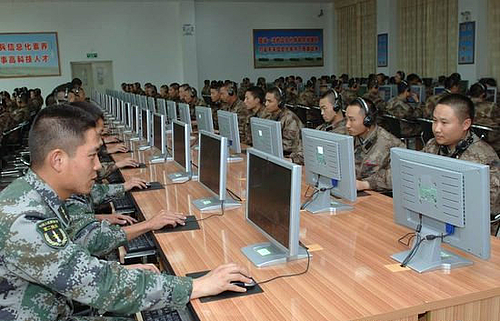
From Michael Riley and Dune Lawrence, Bloomberg: [T]he spies were themselves being watched. Working together in secret, some 30 North American private security researchers were tracking one of the biggest and busiest hacking groups in China.
Observed for years by U.S. intelligence, which dubbed it Byzantine Candor, the team of hackers also is known in security circles as the Comment group for its trademark of infiltrating computers using hidden webpage computer code known as “comments.”
During almost two months of monitoring last year, the researchers say they were struck by the sheer scale of the hackers’ work as data bled from one victim after the next: from oilfield services leader Halliburton Co. (HAL) to Washington law firm Wiley Rein LLP; from a Canadian magistrate involved in a sensitive China extradition case to Kolkata-based tobacco and technology conglomerate ITC Ltd. (ITC)
Gathering Secrets
The researchers identified 20 victims in all — many of them organizations with secrets that could give China an edge as it strives to become the world’s largest economy. The targets included lawyers pursuing trade claims against the country’s exporters and an energy company preparing to drill in waters China claims as its own.
“What the general public hears about — stolen credit card numbers, somebody hacked LinkedIn (LNKD) — that’s the tip of the iceberg, the unclassified stuff,” said Shawn Henry, former executive assistant director of the FBI in charge of the agency’s cyber division until leaving earlier this year. “I’ve been circling the iceberg in a submarine. This is the biggest vacuuming up of U.S. proprietary data that we’ve ever seen. It’s a machine.”
Exploiting a hole in the hackers’ security, the researchers created a digital diary, logging the intruders’ every move as they crept into networks, shut off anti-virus systems, camouflaged themselves as system administrators and covered their tracks, making them almost immune to detection by their victims.
Every Move
The minute-by-minute accounts spin a never-before told story of the workaday routines and relentless onslaught of a group so successful that a cyber unit within the Air Force’s Office of Special Investigations in San Antonio is dedicated to tracking it, according to a person familiar with the unit.
Those logs — a record of the hackers’ commands to their victims’ computers — also reveal the highly organized effort behind a group that more than any other is believed to be at the spear point of the vast hacking industry in China. Byzantine Candor is linked to China’s military, the People’s Liberation Army, according to a 2008 diplomatic cable released by WikiLeaks. Two former intelligence officials verified the substance of the document. . . .
Private researchers have identified 10 to 20 Chinese hacking groups but said they vary significantly in activity and size, according to government investigators and security firms.
Group Apart
What sets the Comment group apart is the frenetic pace of its operations. The attacks documented last summer represent a fragment of the Comment group’s conquests, which stretch back at least to 2002, according to incident reports and interviews with investigators. Milpitas, California-based FireEye Inc. alone has tracked hundreds of victims in the last three years and estimates the group has hacked more than 1,000 organizations, said Alex Lanstein, a senior security researcher.
Stolen information is flowing out of the networks of law firms, investment banks, oil companies, drug makers, and high technology manufacturers in such significant quantities that intelligence officials now say it could cause long-term harm to U.S. and European economies.
‘Earthquake Is Coming’
“The activity we’re seeing now is the tremor, but the earthquake is coming,” said Ray Mislock, who before retiring in September was chief security officer for DuPont Co., which has been hacked by unidentified Chinese teams at least twice since 2009. . . .
Adding a potentially important piece to the puzzle, researcher Joe Stewart, who works for Dell SecureWorks, an Atlanta-based security firm and division of Dell Inc. (DELL), the computer technology company, last year uncovered a flaw in software used by Comment group hackers. Designed to disguise the pilfered data’s ultimate destination, the mistake instead revealed that in hundreds of instances, data was sent to Internet Protocol (IP) addresses in Shanghai.
Military Link?
The location matched intelligence contained in the 2008 State Department cable published by WikiLeaks that placed the group in Shanghai and linked it to China’s military. Commercial researchers have yet to make that connection. The basis for that cable’s conclusion, which includes the U.S.’s own spying, remains classified, according to two former intelligence specialists.
Lanstein said that although the make-up of the Comment group has changed over time — the logs show some inexperienced hackers in the group making repeated mistakes, for example –the characteristics of a single group are unmistakable. The code and tools used by Comment aren’t public, and anyone using it would have to be given entre into the hackers’ ranks, he said.
By October 2008, when the diplomatic cable published by WikiLeaks outlined the group’s activities, the Comment group had raided the networks of defense contractors and the Department of State, as well as made a specialty of hacking U.S. Army systems. The classified code names for China’s hacking teams were changed last year after that leak.
Cybersecurity experts have connected the group to a series of headline-grabbing hacks, ranging from the 2008 presidential campaigns of Barack Obama and John McCain to the 72 victims documented last year by the Santa Clara, California-based security firm McAfee Inc., in what it called Operation Shady Rat. . . .
Richard Falkenrath, former deputy homeland security adviser to President George W. Bush, said China has succeeded in integrating decision-making about foreign economic and investment policy with intelligence collection.
“That has big implications for the rest of the world when it deals with the country on those terms,” he said. (photo: MIC Gadget)
Image: micgadget%207%2030%2012%20China%20cyber.jpg
